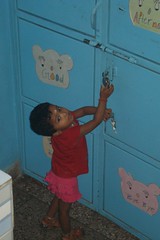
by Anuradha Bakshi | Jul 7, 2008 | Uncategorized
 India’s illiterate population equals all the people in USA screamed the headline of a State of the Indian Education report in a leading newspaper. It did not end there. The other headliners were: 9 out of 10 in class I won’t get to college, Most students pass, few actually learn and the supporting statistics were nothing short of chilling.
India’s illiterate population equals all the people in USA screamed the headline of a State of the Indian Education report in a leading newspaper. It did not end there. The other headliners were: 9 out of 10 in class I won’t get to college, Most students pass, few actually learn and the supporting statistics were nothing short of chilling.
India does a good job of getting children to start school but fails miserably to keep them studying as they grow older. That is the sad but indubitable reality. And if the pass percentages are increasing thanks to dubious programmes, the learning curve is declining day-by-day.
The report was alarming. Education for all seems to have failed miserably. True that the numbers ring true: number of children going to school, number of schools, number of teachers and even number of children passing, but the ground reality is abysmal. In our rush to meet quantity, quality was forgotten along the way. True we have schools buildings but a large number of them are not fit for consumption!
Politicians are busy securing their future and brandishing issues like reservations in higher education for the most backward classes and castes, but one wonders who will benefit from these lofty programmes. I guess their own kith and kin armed with a sound education obtained from a good public school.
Education for the poor in India is dying a slow insidious death. The onus of a good education for all has to be on the government who alone can provide the needed resources and regulatory systems but the government seems to have failed, and in some cases even given up as is amply proved by the rush to hand over education to NGOs or private hands. Privatisation of education will ring the death knell of education for the poor.
A couple of years back I was contacted by a high ranking officer in the Municipal Corporation of Delhi. A proposal for handing over municipal schools was being mooted. The officer wanted to know if i would be willing to take over the school located near our centre. This school is mostly attended by extremely poor and deprived kids. Wanting to now more I decided to play the game before hitting out and asked him what the deal was. We will pay the teachers salaries and you need to take over the rest was the answer. I wondered where the rest was supposed to come from: from donations or from fees. Needless to say the poor man got a mouthful from me! I had almost forgotten this incident.
Education in India today is a very sick child. And I am not only referring to state run schools. The other end of the spectrum is as dangerous. Instead of regular places of learning have sprung designer schools that bear no resemblance to what a school should look like hence alienating children from the reality that surrounds them and that they will one day have to live in. A ride from an air conditioned home in an air conditioned bus to an air conditioned school is what school is for some. Has one forgotten the gurukool of yore times where even the king’s sons had to undergo rigorous and austere training?
Where is the solution? I wonder….
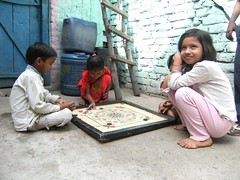
by Anuradha Bakshi | Jul 3, 2008 | Uncategorized
 A few more musings in continuation to my last post about the new no-fail policy announced yesterday by the Delhi Government. At the outset I would like to say that in an ideal situation I, more than anyone else would have welcomed this move more than anyone else, and may I add that even a few years back, when I was still blissfully unaware of the ground reality about the education scenario in Delhi, I would done so too. Sadly today that is not the case.
A few more musings in continuation to my last post about the new no-fail policy announced yesterday by the Delhi Government. At the outset I would like to say that in an ideal situation I, more than anyone else would have welcomed this move more than anyone else, and may I add that even a few years back, when I was still blissfully unaware of the ground reality about the education scenario in Delhi, I would done so too. Sadly today that is not the case.
My thoughts were seconded by most of my teaching staff who were stunned at this new reality that would alter many things for us at pwhy! A very well packaged news item was aired yesterday on a leading metro channel to herald and applaud this new move. It even had a dazzling title and tag line: arresting girls drop out rates!
Based on my experience of almost a decade let me play Devil’s Advocate. The policy of not retaining any child in primary classes has already shown its true colours. Children, and there is an abundance of them, sit in class IV or V barely knowing their alphabet or numbers. Till date class VI loomed large as a place where they would have to perform and motivated parents as well as children to try better. I say parents because for them it was examinations and their marks that altered behaviour. Let me explain.
Examinations and the ensuing risk of failure was a deterrent that would make the child work harder and the parent more lenient. Many little girls are spared house chores during exam time and many unruly boys are bullied to sit and study. Parents in spite of their somewhat modest means find ways to send their children for tuition because of the exams and failure risk. This is a boon in disguise as we all know how much teaching there actually is in state run schools. Marks are something the poor and illiterate relate to, grading and alphabets belongs to an alien world.
A quick perusal of the proposed scheme shows that though it is lofty in its ideal, it is bound to fail on the ground. The actual education system barely manages to muddle through a conventional system; wonder what will happen now as the teachers and their ways cannot see a dramatic transformation simply because a new law has been brought into existence. What will happen is that the back up system that existed – parents attitude, extra coaching etc – will merely disappear as no exam and possibility of failure exists.
Even the kids will not feel the need to study and learn as they will know that no one can fail them till class VIII. Hence they will reach class VIII or IX with an enormous amount to catch up with as ultimately they will have to sit for an end of school examinations where marks hold the keys to the future.
Not a happy situation.
Pwhy’s secondary teachers were almost up in arms when they heard the news as they more than anyone else have the daunting task of making up for years of poor performance. And as one quiet voice said: maybe parents will stop sending their kids to pwhy as one of the main reasons they had was to ensure that their children do well in examinations.
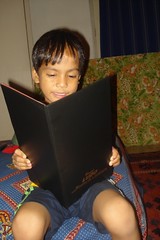
by Anuradha Bakshi | Jul 2, 2008 | common school
 A news item aired on a local TV channel caught my attention yesterday and made my almost congealed blood run cold once again: the Delhi Government had decided to pass all children till class VIII, doing away with examinations and marks in order to contain drop out rates and free the children from stress and angst. The children would be graded whatever that meant.
A news item aired on a local TV channel caught my attention yesterday and made my almost congealed blood run cold once again: the Delhi Government had decided to pass all children till class VIII, doing away with examinations and marks in order to contain drop out rates and free the children from stress and angst. The children would be graded whatever that meant.
Wow would say many, way to go. Sadly that is not the case and once again we are witness to half baked and politically motivated solutions governments are notorious for. The kind of formula that looks good on paper, replete with supporting statistics but does nothing to address the reality.
My recent post entitled ‘equal opportunities‘ skimmed the tip of the iceberg. The problem is not with having exams or not. If schools continue to run as they do, doing away with exams will simply delay drop out time to class VIII. Statisctics would have been doctored to look better. Every Delhi kid would have passed class VII. Whether he or she would have learned anything at all would remain a million dollar question.
In the present scenario children in class IV or V are barely literate. There is practically no teaching worth its name, let alone learning in most of the municipal and government schools. With no examinations and no failing one wonders what will happen. Another Alice in Wonderland situation!
A no exam system can only work in an enabling environment, where teachers take on the responsibility of imparting knowledge in a wider sense. The best example of these are what is widely known as alternative schools, where learning acquiring a new meaning altogether, where classes are small and teachers many. In Delhi schools, even better ones, classrooms are jammed packed. Over fifty children or more are taught by one teacher.
Exams, no matter how bad and stressful, did ensure that every child’s knowledge was tested and remedial measures taken at the appropriate time. With a no exam no failing situation children will just move from class to class with no check or balance. And by the time they reach class VII, it just may be too late for many. One must not forget that most of the children who attend such schools have illiterate parents and hence no way of being assessed or helped at home.
As long as schools remain as they are, such a decision spells disaster.
We need to redefine the society of schools, and turn schools into true temples of learning; a place where children from all walks of life can grow together in a nurturing and enabling environment: a common neighbourhood school that is a true level playing field. It is not just a matter of arresting drop out rates, but giving each child equal opportunities and respecting his or her constitutional right to free and fair education.
Is anyone listening!
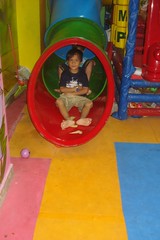
by Anuradha Bakshi | Jul 1, 2008 | Uncategorized
 Day two of the book launch and what a day it turned out to be. Two events were planned in two locations as different from each other as chalk and cheese: a very upmarket hospital and a middle suburban mall; the common denominator: the presence of a chain book outlet. I must admit that the choice of the hospital was rather bemusing as the launch was to include a theatrical performance. But ours is not to…
Day two of the book launch and what a day it turned out to be. Two events were planned in two locations as different from each other as chalk and cheese: a very upmarket hospital and a middle suburban mall; the common denominator: the presence of a chain book outlet. I must admit that the choice of the hospital was rather bemusing as the launch was to include a theatrical performance. But ours is not to…
As we were getting ready, a telephone call informed us that our dear publisher had taken ill at night and was feeling hellish. Ominous…
We reached the hospital and weaved our way to the tiny bookstore located in one of the numerous waiting halls filled with anxiety ridden families where the hum was often broken by incomprehensible announcements over a PA system. The appointed hour of the event struck and went by. Confusion prevailed and tempers threatened to rise. Chairs were moved around and bewildered people were made to readjust themselves. Soon a trio took seat next to the bay window and started beating a drum. I do not know why but what came to my mind was a page from Alice in Wonderland. Were we to be guests at the Mad Hatter’s tea party?
Drums beating in a space replete with Silence Please signs looked incongruous. We barely had time to take the situation in when a posse of angry looking men arrived and put a stop to the whole show. A senior doctor had objected, quite rightly, to the noise and ordered it be stopped. By that time some guests had arrived to, each one wondering what was happening. What ensued was a expected: parleys and discussion, a bit of blame game and then the inevitable: there would be no launch, no book reading, no show.. It was time to pack up, the party was over.
Anyway there was still another launch, later in the day, miles away..
Come 4 pm and we all gathered in a middle class mall near the food court and blissfully the kids play area. This little messy mall was more to my liking than the hoity–toity one of the first launch. The stage had been set, the actors were ready and the show would begin once a mike was found. In the meantime the play area beckoned big and small and Utpal, Kiran and Shamika decided to have a blast, and boy they did!
In the meantime a mike had been found and the show began. A rendering of parts of Dear Popples and the Prayer and then some book reading. A handful of people watched the on-goings, and then it was time to go bit not before some goodies were bought to be savoured during the long return drive.
All in one the two day experience was one to remember. Nothing was as expected and yet when one looks back a lot did happen: wonderful connections were made, a family of five was saved and a bunch of kids big and small had a whopping time!
here are some pictures of day 2
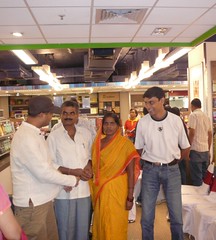
by Anuradha Bakshi | Jun 30, 2008 | Uncategorized
 Dear Popples was launched this week end. A series of events – three actually – had been carefully planned: two in malls and one in a hospital! I must confess that the past few days had been filled with excitement and apprehension. Dear Popples is the first book I have written and hence this was to be my first launch. I had been told that there was to be a book reading and signing and a quiz where people would play for a miracle. At the end of the day Basant and Rekha’s family would be saved. Over 100 people I was told, had entered the contest! This was great news. The event promised to be a whopping success. Innumerable calls were made, and mails were sent to ensure that may would attend.
Dear Popples was launched this week end. A series of events – three actually – had been carefully planned: two in malls and one in a hospital! I must confess that the past few days had been filled with excitement and apprehension. Dear Popples is the first book I have written and hence this was to be my first launch. I had been told that there was to be a book reading and signing and a quiz where people would play for a miracle. At the end of the day Basant and Rekha’s family would be saved. Over 100 people I was told, had entered the contest! This was great news. The event promised to be a whopping success. Innumerable calls were made, and mails were sent to ensure that may would attend.
Saturday morning dawned. I must admit the night had been short. A palpable sense of excitement permeated the house as we all got ready. There were many of us, almost the same gang that takes the monthly ride to Utpal’s PTM except that this time Utpal, was with us. Rekha and Basant had come early. Abhigyan, my wonderful publisher who I had finally met the previous day arrived and it was time to leave. The event was in a brand new mall in Gurgaon a long drive away. We reached the mall. It was the very one where we had come to a year back for a PTM. Ominous!
We reached the right gate and could see the sparkling book store an escalator ride away on the first floor. But Rekha being blind and having never in her life seen or heard about moving staircases, we set off in search of a lift or staircase. We found a lift but though we reached the said foor, we found to our utter dismay that there was no access to the store. There was no staircase either. How did one get Rekha to the store. Finally with much effort we managed to convince the operator to stop the escalator. Rekha was made to climb on it and then the machine was restarted. It was an ordeal and I cannot even begin to think what must have gone in the poor woman’s mind. At last every one reached the store.
The place had been beautifully laid out with chairs, and armchairs, tables ans flowers, large display of the books to be launched, larger than life sized posters, a screen, mikes et al. What was missing was people though the said time had past. Once again I was reminded of Kafka. Barring us there was no one. One could almost sense moods changing. Anger in some, bewilderment in others. A sense of amused deja vu filled me. Oh darling hey hai dilli was what I felt like screaming. People do not come out of their comfort zones at 11 am on a Saturday morning, people fill forms for quizzes ans events and hen simply do not turn up, people promise to be there and then forget to come or forget to inform that will not. Anyway the chairs lay empty for a long time. Slowly friends who had been solicited, entreated and bullied started trickling in and some chairs got filled. Even Mrinal and Anil, whose flight from Mumbai had been terribly delayed made it on time.
But the show must go on and it did. The show had to go on and it did. Rekha and Basant’s miracle had to happen and it did. There was a book reading, a book signing and a quiz even though many chairs were empty and contestants few. What was important was that all present had the ability to see with their heart and hence as the fox told the little Prince only the essential was visible.
You can share some pictures of the event here:
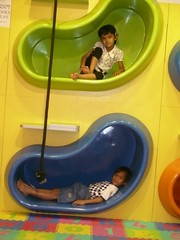
by Anuradha Bakshi | Jun 29, 2008 | Uncategorized
 The last post was angry though I had promised to myself not to succumb to anger. But there are moments when resolves break. I am but human. But the anger passes and often a mellow mood follows, one when you try to reconnect with the simpler things and heal yourself.
The last post was angry though I had promised to myself not to succumb to anger. But there are moments when resolves break. I am but human. But the anger passes and often a mellow mood follows, one when you try to reconnect with the simpler things and heal yourself.
Last week was so hectic – a book launch, an important visit and a bout of fever – that I almost forgot a very precious incident. Utpal spent some days at home. One evening he went to the market with Radhey his long time pal and came back with a small glass bowl filled with what looked like glass beads but turned out to be made of some gooey unidentifiable and quite yucky matter. He was all excited as he entered my tiny office clutching his precious ware. He stomped to my table and placed the bowl carefully: he then turned to me and said: this is a present for you, it shines at night so you will not be scared when it is dark!
Needless to say, I was terribly moved – throat tight and tears welling up – as I hugged the little fellow. Needless to say that the cheap glass bowl suddenly became very precious. For those of you who do not live in Delhi and hence do not spend time at red lights getting pestered to buy strange ware, this is the latest offering from China. A small packet filled with what looks like glitter till it is placed in water where t swells to 600 time its size and becomes gooey beads. A glass bowl comes with it, or you may just buy a bowl filled with already bloated beads. Wonder how many people do buy them, and why.
My bowl is unique, just like the Little Prince’s rose. For Utpal it was something that could adorn my sancto sanctorum, a place replete with memorabilia of all kind, each having a story to tell. It is not simply a glass bowl filed with cheap gooey beads. It is what little Utpal found good enough to have a place in my office. It is laced with the love and tenderness of a little boy. I know it will sit on my table for a long time and I also know that my eyes will often stray towards it as my heart fills with wonder and pride. And perhaps, it may just soothe any threatening bout of anger in days to come.
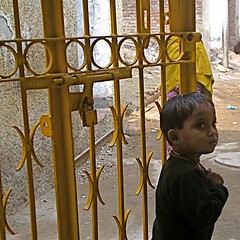
by Anuradha Bakshi | Jun 28, 2008 | Uncategorized
 A comment on my latest post reads: A comprehensive solution that caters for reduced population growth, offers equal opportunities to all Indians, offers a fair and just judicial system, and a fair market where people can achieve their goals with no fear is what we need. Wow! Wish one knew how to conjure that, but sadly one does not have the magic wand required. The commentator feels that we cannot limit ourselves to education and perhaps he is right, but to me it seems to be the only logical starting point that may one day open many doors.
A comment on my latest post reads: A comprehensive solution that caters for reduced population growth, offers equal opportunities to all Indians, offers a fair and just judicial system, and a fair market where people can achieve their goals with no fear is what we need. Wow! Wish one knew how to conjure that, but sadly one does not have the magic wand required. The commentator feels that we cannot limit ourselves to education and perhaps he is right, but to me it seems to be the only logical starting point that may one day open many doors.
One does not have to be a rocket scientist to realise that in today’s day and age, the well educated have a head start in life and maybe the Education for All programme should be renamed as Good Education for All or Fair education for All!
While I was writing this post another comment dropped by. It said pardon me, but i fail to see the social evil of a prestigious educational institution raising its bar. the tougher the goal, the harder one works, the better the ones who qualify and the better the end result. Education is a right, but excellence is a prize one must earn. It is sad indeed that your students will now not be able to enter DU, but surely there are other places they can, and if they are not motivated/empowered to begin with, what magic is an admission in a university going to make? I am saying your students are to be blamed for bad performance, i have worked among high school dropouts and i know at least some of the difficulties and so i suggest you turn this in to an incentive for the rare motivated child, than turn it into an opportunity to complain.
I mean no ill will, this is not a rebuke, please do not take offense, i merely want you to think again.
I must admit that at first it raised my heckles. But with all due respect to the commentator who chose to remain anonymous I did think again as suggested and rather than go into a useless diatribe I chose to answer each point made.
There is certainly no social evil in any education raising its bar provided every bar down the line is also raised. I mean let us raise the pass percentage of school leaving examinations. When I was a student the highest marks veered around 65% with a low of 33. Today we see 99% at one end still 33 at the other. The tougher the goal the higher one strives is again an acceptable maxim but how does one reach that goal if one of the contestant has to run the race with his feet tied up. Let me explain in some government schools – and I have this from the horses’s mouth – the entire curriculum is not even taught as iIwas told by a school Principal: only 40% is needed to pass. And I am not even mentioning minor adavantages like educated parents, access to good books, computers etc.
No Sir, most my students will not access prestigious institutions but not because they do not have the ability to do so, but because they have run a lame race from the beginning. And true there is no magic in an admission to a university, but every child has a right to this access.
Of all that has been written in this comment, the one thing I cannot and will not accept is that my students are to blame for bad performance. How do you blame a kid who has never been taught properly in school. one that goes back to a violent and abusive home, one whose childhood has been hijacked by all. Every child has potential. It is our duty as a society to provide an enabling environment from him or her to grow to its full potential.
If schools did provide that enabling environment then there would be no reason to complain. Schools today simply reflect our society. They are schools for the rich that become richer and school for the poor that seem to become worse by the day. If one has air conditioned facilities the other does not even have toilets or drinking water. School has to be a level playing field, a learning experience, a place to discover that other realities exist, a space to rub shoulders with all and share knowledge. Only then will every child have the possibility to access higher portals and contribute to the change we all seek. And only then will I accept the accusation levelled against my kids.
Yes anonymous friend I have thought again, and it has made my resolve stronger. It is time we offered equal opportunities to all Indians.
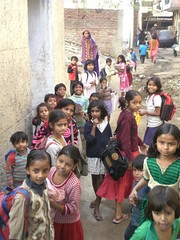
by Anuradha Bakshi | Jun 26, 2008 | Uncategorized
 The Delhi University cut off lists are out. A whole 1% higher than last year! You need 90% and more to secure a seat in a prestigious college, and at least 75% to find space in DU (Delhi University). Anything less than that leaves you with few choices: a correspondence course or if you family is endowed, a seat in the new kids on the block: the mushrooming private colleges and institutions that come at a hefty price.
The Delhi University cut off lists are out. A whole 1% higher than last year! You need 90% and more to secure a seat in a prestigious college, and at least 75% to find space in DU (Delhi University). Anything less than that leaves you with few choices: a correspondence course or if you family is endowed, a seat in the new kids on the block: the mushrooming private colleges and institutions that come at a hefty price.
Statistics show that over 100 000 kids passed their class XII Boards. However one wonders where most of them will go as the pass percentage marks remain frozen in time. 35% still gets you your exam and 60% still gives you the 1st division tag.
Something is not right. Or are we mute spectators to a system that pays lip service to education for all while ensuring that the spoils remain the prerogative of a few.
For almost a decade now we have been striving to ensure that children from underprivileged homes do not drop out of school and obtain the much coveted class XII Board. It has been a handicap ridden obstacle race. Practically no teaching in schools, illiterate homes, poor motivation of parents and more. And yet year after year we have ensured that all pwhy get the coveted pot of gold. I must admit that though we have had a handful of 1st divisions (above 60%) and a sprinkling of kids with 70% and above, the majority of pwhy children secure marks between 45 and 52%. This means that the doors of DU are closed to them. And as they all come form poor backgrounds, they cannot accede to private institutions. Somehow for them the journey ends there.
Boys may join some vocational course or the other and maybe a get a job; girls are condemned to stay home waiting to be married off and produce more children who will be destined to teh same fate.
The sad reality is that one cannot see the end of the tunnel. One may wonder where the solution lies or is it that we just accept that we are fighting a losing battle. We all seem to agree that education is the magic potion that would change India. But is it the kind of education that we see around us today?
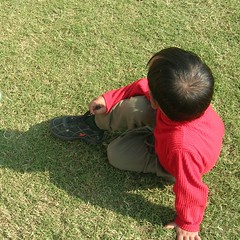
by Anuradha Bakshi | Jun 24, 2008 | Uncategorized
 How many of us do actually switch off lights when we leave a room, never leave our computers or TVs on stand by, segregate our house waste shut the tap off while we brush our teeth, carry a cloth bag during all our shopping sprees, or travel in a car pool. Not many I guess. But are we not also the many who lecture others on all of the above, nod our heads vigorously during any debate on saving the environment and are the first to sign any petition on the same.
How many of us do actually switch off lights when we leave a room, never leave our computers or TVs on stand by, segregate our house waste shut the tap off while we brush our teeth, carry a cloth bag during all our shopping sprees, or travel in a car pool. Not many I guess. But are we not also the many who lecture others on all of the above, nod our heads vigorously during any debate on saving the environment and are the first to sign any petition on the same.
Yesterday someone mentioned a recent article predicting that the North Pole would actually melt this summer. His words brought terrible images to mind, yet before this could truly sink in, the conversation that was threatening to become disturbing moved on, as is too often the case, to a lighter vein. Somehow we always tend to push away what has the potential to rock our boat.
Yet the writing is on the wall: global warming is no more a topic to be debated it lies at our doorstep as we have seen this summer in Delhi. True that there was practically no summer this year, no hot searing heat that sweetens the melons and kills the mosquitoes. True again that the rains came early and the temperature remained low. But this is no cause to rejoice as it is a portent of things to come. Nature has been disturbed and no one knows what lies ahead.
Awareness on environmental issues has been something that we at project why have tried to disseminate, and I say tried, as I must confess our attempts have not been successful or maybe not wholehearted enough. Most of our efforts failed as they clashed with mindsets – our children will never clean streets was the answer to our no plastic programme – or social attitudes.
And yet we know that something needs to be done. It is with this in mind that I approached a friend who walks the talk as far as environment issues go. What I sought was a scintillating project that would look good on the pwhy CV! What my friend suggested was quite the contrary. Have every one follow a zero carbon hour, was his quiet suggestion. I was a tad confused as it made no sense to me. He set out to explain his idea. What he meant was that each one of us, collectively or individually, should once a day or once a week spend one hour where we ensure that our carbon footprint is nil. Translated in other terms it means that for that one hour we use no cellphone, no computers, no iPod, no TV, no cars, no electricity, no fuel of any kind. And further translated in practical terms it means that for one hour you just take a walk or sit in a park or in a room weather permitting.
At first it seemed nothing short of preposterous and yet as I pondered over it, it was a overwhelming. A simple idea and yet one that had immense power as not only was it kind to the environment but also good for us individually. A forced meditation pause that would ensure we get off the spinning wheel and reconnect with ourselves. And there was no excuse as it cost nothing, needed no props or training and could be followed by all.
At this moment of time I do not know how this will be accepted by our team. I do foresee obstacles and hurdles but at the same time I know I am going to use all the power I have to see it happen: maybe not an hour to start with but 30 minutes; maybe not everyday to begin with but once a week but we at project why will adopt a zero carbon hour programme.
To be continued…
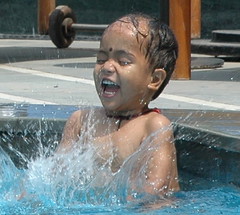
by Anuradha Bakshi | Jun 23, 2008 | Uncategorized
 Why is God laughing is the title of Deepak Chopra’s latest book. I have not read it. Yet, just the title filled me with a deep sense of joy.
Why is God laughing is the title of Deepak Chopra’s latest book. I have not read it. Yet, just the title filled me with a deep sense of joy.
A review of the book states: it shows us without a doubt that there is always a reason to be grateful, that every possibility holds the promise of abundance, and that obstacles are simply opportunities in disguise. In the end, we really don’t need a reason to be happy.
Why is God Laughing. I guess simply because he sees the big picture and knows that ultimately all falls in place. And I guess wisdom lies in realising just that.
We, humble mortals, have perfected the art of holding on to the tiny bad moment forever, wallowing in it, and refusing not only to let it go but refusing to look beyond. And thus zillions of happy and almost perfect moments pass us by.
I must admit that there was a time when I too did just that. But pwhy changed it all. The past few years have shown me that every moment is worthy of celebration and that nothing is too daunting; one just has to have the ability to wait that little extra moment as even the darkest cloud has a silver lining.
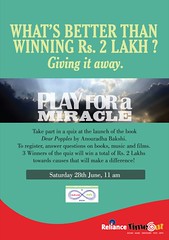
You can think that there will never be a way out of the momentary darkness, and yet there is. And what is amazing is that the way out is often most unexpected. When Basant first came to me, I could not even begin to imagine how we would help this little family as dice seemed loaded against them. And yet God was quietly laughing as he knew the way out. And what is truly wondrous is that the solution would bring together unrelated things. The launch of dear popples, a precious personal dream, would also usher a new dawn for Basant’s family
And this is but one example, the latest in a series of plenty. I never imagined how manu, utpal. babli, neha and many others would come out of their darkness, and yet they did, each one of them in the most unexpected ways.
Yes God is laughing and I am busy being grateful!
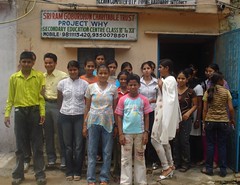
by Anuradha Bakshi | Jun 21, 2008 | Uncategorized
 This is project why’s class of 2008. They have all passed their Boards examinations and are ready to taken their first steps in the outside world with confidence and aplomb.
This is project why’s class of 2008. They have all passed their Boards examinations and are ready to taken their first steps in the outside world with confidence and aplomb.
But yesterday was party time and this picture was taken just a few minutes before they set out for a movie and a treat. I watched them set off with a sense of pride laced with a dash of sadness. This was probably the last time I would see them all together. The morrows belonged to them.
One just hoped that the few years they spend with us would help them in their new ventures. Some are planning to go to college, others are looking for vocational training options. Some may soon be married and others may need to start working to help their families. Some may drop by and see us; others we may never see again. And yet they remain part of us.
farewell class of 2008!
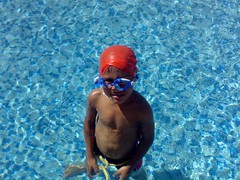
by Anuradha Bakshi | Jun 19, 2008 | Uncategorized

The world is full of wonders and miracles but man takes his little hand and covers his eyes and sees nothing. The words of Israel Baal Shem came to my mind when I saw this picture after a long time. Actually I was putting together a presentation for the launch of dear popples and hence looking through old pictures.
Anyone looking at this child splashing away in a five star pool would never believe that he had once been practically written off by all! And yet today he lives, laughs, goes to a boarding school and is just another little happy boy. He is one of the many miracles that have come our way but that we tend to hide by covering our eyes with our little hand. Or is it that we at project why have simply become inured to the plethora of wonders and miracles that have come our way.
A young girl who tops her school, a handful of kids who are busy making up for lost time now that their hearts are fixed, a young mother fighting a debilitating disease, a disabled beggar who now has a warm bed, a home and a new family, a bunch of kids who would have dropped out of school but who now are assured of a sound education and a small family quietly waiting for a miracle.
I am glad that seeing this lovely snapshot brought Baal Shem’s words to my mind. Far too often in life we tend to glean over tiny problems and minor impediments and forget all the wonders around us. And lost in our limited vision we simply forget to be grateful for the abundance that surround us.
It is time we took away our little hand from our eyes and simply looked around with us with gratitude.
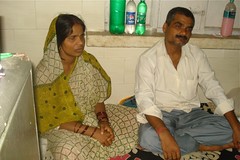
by Anuradha Bakshi | Jun 15, 2008 | Uncategorized
 In a tiny room where barely a bed and a small cupboard fit sit Basant and Rekha. They have been living in this ‘free’ dharamshala (hospice) for almost a month now, but this has not been their first stay here. They are now old hands at living in hospitals across the land.
In a tiny room where barely a bed and a small cupboard fit sit Basant and Rekha. They have been living in this ‘free’ dharamshala (hospice) for almost a month now, but this has not been their first stay here. They are now old hands at living in hospitals across the land.
Their story beats any of the tear jerking celluloid tales so popular in the sixties, the only difference is that it is not a story but real life. The quiet acceptance and the sated dignity are not performances that will beget national awards. The love, tenderness and compassion chiseled on Basant’s face is not for the cameras, it is what he truly feels for his blind wife. He does not even remember how long it has been, or how many hospitals in how many cities he has visited to try and rekindle the light in the eyes of his wife. They have now been at AIIMS for the umpteenth month an were held the last blow a few days back: the cost of medicine that may restore some vision to Rekha’s eyes was so prohibitive that they did not even take the name of the pills that come at 45o rs a piece and of which 2 have to be consumed each day for at least 30 days.
There is no anger, no bitterness, no indignation; at best what one feels is a sense of dignified resignation. Many blows have come in the way of this couple but they have accepted each one of them and tried to move on. It was only a few weeks ago that Basant was told that he needed immediate heart surgery at the mind boggling cost of 100 000 rs. More figures that have far beyond the realm of reality for them. A date was fixed: 7 June 2008. It past as they were unable to pay the money.
For this man who once had a small business and enough money to live an honest life, living on charity must be belittling, yet he stand patiently in queue for the daily packet of milk or ration that is doled out. He knows he has no other option.In a few days they will be thrown out of the hospice as no one is allowed to stay for more than 30 days at a time. They have scant options: to go back to the village beaten, or try and find a way out.
I came to know about them a few weeks back and since have been trying to get the help they so need. But we need in a world where charity has taken strange avatars. It is easy to get help for a child, perhaps a woman but when you seek the same for a man, you are just shunned. Yet in the broken heart of this man lie the morrows of four souls: three little children deprived of the presence of their parents and their mom. It is no wonder that Basant’s heart needs mending. For too long it has carried the weight of a love no one understands in our world.
Away from their children they wait patiently for a miracle to come their way, for now only a miracle can save them. They have exhausted all other resources. Maybe it is time we start looking at ours. We cannot or will not give up. We will ask Basant and rekha to move to our women centre and keep on knocking at doors till we find the one that hides another heart as big as Basant’s.
Is the God of Lesser beings listening.

by Anuradha Bakshi | Jun 13, 2008 | sustainability
 When i first thought of planet why as a sustainability option for project why I had never heard of social enterprise and social business. It was simply a gut feeling that propelled me in this direction and with every step I walked, it just felt right.
When i first thought of planet why as a sustainability option for project why I had never heard of social enterprise and social business. It was simply a gut feeling that propelled me in this direction and with every step I walked, it just felt right.
From day one, it has been I must admit, an arduous journey. And yet I knew it was one that had to be made as the destination held its own pot of gold.
Two unrelated occurrences came my way a few days back : one was the gift of a book and the other a simple line in an email. The book was by Creating a World without Poverty by Nobel Laureate Mohammed Yunus, and the line in the email came from a young professional riled over the injustice she saw around her. It simply said: the other way to look at this is to assume that economic prosperity once established in a quorum population will ignite a string of social entrepreneurship. but that’s a wait and watch game. Strange synchronicity.
Mohammed Yunus’s views echoes what i have always felt and could not express. The world of philantrophy in which I have been always seemed to fall short of something. It was obvious to me that it could not survive the test of time. Business had always been an alien land where I never felt comfortable. The when you get your maximum, everybody will get their maximum often thrown at you by those holding capitalism at hart, was nothing short of galling. There had to be a via media.
The via media solutions that one saw around us also fell short: state run programmes, NGOs depending on donors to survive let alone grow, CSR initiatives that seemed out of place. The common denominator for all of these was that they espoused a state whereby one group remained a donor and the other a recipient. They all celebrated an unequal world.
Mohammed Yunus’s view tilts the balance in order to establish an equal world by redefining capitalism or let us say by adding a new dimension to the words capitalism. Businesses run with the same efficiency not to line deeper and deeper pockets but to change things and make the world a more even playing field.
The idea of Planet Why stemmed form a real need, that of ensuring pwhy lives on. As it slowly took shape it started looking like what is called a social business. A sound investment option in more ways than one. And though the road is still long and the journey far form over somehow I see light at the end of the tunnel.
So I will end by quoting Mohammed Yunus: Lets get serious about social business entrepreneurs. They can brighten up this gloomy world.
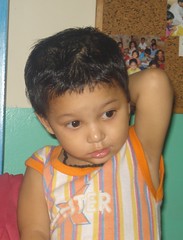
by Anuradha Bakshi | Jun 13, 2008 | Uncategorized

We had two special visitors last week. Little Deepak and Shubhum. For those who may not remember or know them they were both residents of our heartFix Hotel.
Deepak is now a big boy, over two years old and a far cry from the cerulean baby we all feared for. Today he is all set to join our creche and take his firs steps into the big world. A lovely spirited child for whom we know, there is no looking back

Our next visitor was young Shubhum who has come to Delhi from his native village in Bihar for his six monthly check up. An endearing child, Shubhum is keen to study and his dream is to become a doctor. His father a humble tea vendor is doing his utmost to give him a good education in the best school available. Shubhum is already in class V. With young Shubhum came his little brother Rohit.
I often wonder what the God of Lesser beings has in mind when he makes his road maps. Rohit who looks like any normal child suffers from microcephaly. A slow learner with delayed milestones, Rohit is also an aggressive child with poor social skills. Rohit will need specialised care, something not available in his native home.
We have decided to support Shubhum’s studies and are now looking for options for little Rohit.
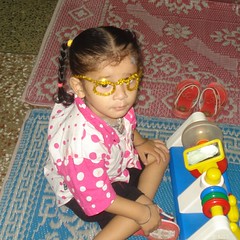
by Anuradha Bakshi | Jun 12, 2008 | Uncategorized
 To many pwhy is just an education support programme with some forays into community work, a clone of many such organisations that dot the land. I guess it is in some ways quite that, in spite of the many small and big moments we have lived in the past nine years. Yet there is another side of pwhy, one often concealed and veiled and yet one that is as precious.
To many pwhy is just an education support programme with some forays into community work, a clone of many such organisations that dot the land. I guess it is in some ways quite that, in spite of the many small and big moments we have lived in the past nine years. Yet there is another side of pwhy, one often concealed and veiled and yet one that is as precious.
A heartwarming mail dropped my way this morning. It came from a very special volunteer who had spent a month with us last year. It simply said: The past 2 weeks have been emotionally tolling for me, but somehow Divinity told me to drop by Pwhy blog. True enough, I felt much better after that. At times I ask myself why, till I came across this story yesterday in my friend’s essay:
A little monk liked to complain about everything he does, about life in general. One day, his teacher asked him to go buy some salt. When he returned, the teacher poured half packet of salt into a glass of water. “Drink it”, the teacher commanded. The little monk did, and whined, “Bitter!!” The teacher then brought the monk to a lake, and poured the remaining salt in. “Drink the lake water”, he said. The monk scooped a cup of the lake water, drank it and, with a big grin, exclaimed, “Refreshing!!” Morale of the story? The amount of pain we have in life is the same, just like the salt. Whether we taste it, depends on how large the container – our heart – is.
I guess this is why Project Why always makes a difference. It opens up my heart and lets me realize there is no point in fixing my eyes on the “small” persona.
I read the words many times. They brought a sense of fulfillment laced with a tinge of sadness. In the last nine years I have seen pwhy change not only the lives of the target beneficiaries, but surreptitiously transform the lives of many young people who come from the four corners of the world to spend some time with us. If each volunteer who has come by has left a little of his or her self, they have also taken with them a little of pwhy. Some keep in touch regularly, others time and again. But each in his or her way have shared the fact that the days spent as made a tangible change in their lives. The sadness I mentioned earlier is that most of the young souls have been from other lands or live there. I have not been able to stir the same feelings in those who live round the corner.
I however still believe in miracles, and hope that one day they too will learn to look with their hearts.

by Anuradha Bakshi | Jun 12, 2008 | two indias
 When I read your blogs most often the word that used to strike me was “angry”; how angry you were about the system, situation and people. for the first time i think i experienced that were the words that dropped into my inbox yesterday. It was from M, a dear friend and supporter who lives thousands of miles away and who has become a confident and close ally. Perhaps it is because we share the same dreams, however impossible they may seem, notwithstanding our age difference or the fact that we live in two different worlds. Perhaps again it is because we both at some times of our lives learnt the fox’s precious lessons and look with our hearts!
When I read your blogs most often the word that used to strike me was “angry”; how angry you were about the system, situation and people. for the first time i think i experienced that were the words that dropped into my inbox yesterday. It was from M, a dear friend and supporter who lives thousands of miles away and who has become a confident and close ally. Perhaps it is because we share the same dreams, however impossible they may seem, notwithstanding our age difference or the fact that we live in two different worlds. Perhaps again it is because we both at some times of our lives learnt the fox’s precious lessons and look with our hearts!
She often reads my blogs and gives her views, or we exchange emails on issues that disturb us and often realise that our views or similar. However this is the first time she reacted vehemently and shared what many feel is my anger. M was referring to an article that appeared in the New York Times and depicted life in one of the upcoming and fashionable suburbs of our metropolis. It portrayed in graphic details the life of the two Indias hat live side by side but not in symbiosis. Swanky flats adjacent to crowded slums were residents of both interacted for some hours of the day as one bought comfort and ease to the other. What had riled M was the apparently innocuous and yet portent remark of one of the residents, a Doctor by training, who confesses having thought about opening a clinic in the nearby slums but feels that there is little she or anyone else could do.
M cannot not understand how one could simply waste an education, or put in other words how people lose their conscience somewhere along the way. Or to put it yet again in other words: how one could remain insensitive to the reality that was so obviously there to see.
There are no easy answers. A comment on a recent blog I wrote sent a chill down my spine. To my now almost legendary ranting and ravings about a disquieting issue, the commentator proffered the following: Yes times are changing…… its the beginning of the end.
I hope you don’t harbour any misconception that this civilisation can be changed for the better. We are too conditioned for that. Civilisation began in places like India and here will (or already) it die first. This is not a judgement but an observation. The evolution is merciless and creates the new on the death of the old. Pray for strength to see through the tough and tougher times to come. There is no point in reacting. Lets learn to mute witness to the process of life.
My answer is simple: sorry I do harbour hope that things can change for the better. No bigger example than a warm day in march 2003 as held a death sentence in my hand and yet also saw life. Today Utpal lives for all to see! I am not conditioned and cannot be a mute witness. It would be an insult to my very existence.
Yet one wonders if this is easy way out one could adopt to whitewash every and anything that seems to be out of sync. Like the proverbial karma that is thrown at you each time you try and solve an issue, suggest an alternative or simply do some good an thus threaten to rock the boat.
Too many today hide behimnd the cloak of fatalism and yet each time I am comfronted with a situation like this one, my determination to carry on no matter what takes a quantum leap. It seems that we have walked the passive acceptance route for so long that we have along the way lost our conscience, our sensitivity and our ability to look with our hearts hence defeating the very essence of the karmic view of life. It is easy to wave another person’s karma for all to see, but what about our own. Is it not time to turn the mirror towards ourselves?
Sinking into comfort zones or burying our heads in the sand is not a solution we can be proud of. Change or the much heralded transformation of society can only come when we assume responsibility of what surrounds us and take a step, no matter how tiny towards setting things right.
We cannot wait for Godot. He is there in each one of us, it is for us to find him.
I will end this post with M’s words as they reflect the deep seated anguish of a young Indian: how do we as a society inspire such people to stop squandering their education? i understand that everyone has the right to whatever education they want and to respect their choice on what they do with that education. but are we really a billion people with no concept of “pay back” to our society? what sort of upbringing are we giving our children when we aspire them to complete school, get degrees when we can’t teach them the value of a shared community that benefits from everyone helping out? the other way to look at this is to assume that economic prosperity once established in a quorum population will ignite a string of social entrepreneurship. but that’s a wait and watch game.
It is time to act!
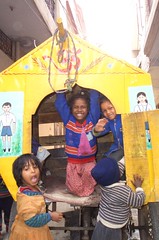
by Anuradha Bakshi | Jun 10, 2008 | Uncategorized
 The spiralling and sky rocketing price of petrol in the past few weeks has finally, or so one hopes, brought to fore the need to pause and think about the necessity to change our ways. Till now the pleas of environmentalists fell on deaf years. At best we nodded agreement to all that was said/written/seen while we fans or ACs ran in empty rooms in our own homes.
The spiralling and sky rocketing price of petrol in the past few weeks has finally, or so one hopes, brought to fore the need to pause and think about the necessity to change our ways. Till now the pleas of environmentalists fell on deaf years. At best we nodded agreement to all that was said/written/seen while we fans or ACs ran in empty rooms in our own homes.
Words life carbon footprint and emissions made good erudite conversation points, the news of glaciers melting brought the right expression of concern, but nothing got translated into action. It was always felt that others were responsible for all the horrors that befell our planet, our contribution to its slow destruction being oh so negligible: what difference could we make.
Even we at pwhy stand guilty of this as we let our awareness and environment programmes wither away. Somehow it found no takers, or perhaps were we not committed enough. Our only true contribution I guess is our use of green fuelled vehicles , a decision taken I must confess not for environmental reasons but practical and humane ones: the three wheelers have better access in slum areas and are owned by parents. I guess one has also time and again made the politically correct noise but how far have the words been translated into action. Not far at all I must admit. True we have solar energy at our women centre but here again it was a gift from a friend.
Our forays into saving the environment have been too far and few. It is so easy to slip back into comfort zones.
The recent petrol hike has shaken everyone out of ts torpor as it now hits where it hurts most: our pockets. Even the powers that be are talking about reducing carbon footprint: cancelling foreign jaunts and looking at alternative means of transport is the latest mantra being chanted in political circles. Recently a foreign visitor wondered whether the metro when it is completed would change things; his question was simple: would people like you and me adopt it as an alternative means of transport leaving our cars behind. Sadly the answer is in the negative. While we are willing to take metros and tubes on our foreign holidays, I wonder how many of us will take the metro to work or to visit a relative on a weekend. One can here again quote Don Ritter “Trying to save ecosystems has more to do with changing egosystems.” It is all a matter of egosystems and unless we change those nothing will really change.
People are finally seeing their dreams come true: the new Bentley or gleaming bike have just come their way so how can you ask them to park them and take a walk and a metro ride. It would be anathema. Will the new petrol price make a difference? I wonder.
Every price hike is finally taken in one’s stride. Smokers still smoke, and Bentleys and Mercedes still drive around. So one wonders what will truly shake us out of our inertia ad compel us to change? I again wonder.
The recent rains are once again a proof of our blinkered view of life. We urban animals and city dwellers are celebrating the cool clime totally oblivious to the fact that this freak weather may delay the monsoons and hence affect the crops.
Are the times really changing….

 India’s illiterate population equals all the people in USA screamed the headline of a State of the Indian Education report in a leading newspaper. It did not end there. The other headliners were: 9 out of 10 in class I won’t get to college, Most students pass, few actually learn and the supporting statistics were nothing short of chilling.
India’s illiterate population equals all the people in USA screamed the headline of a State of the Indian Education report in a leading newspaper. It did not end there. The other headliners were: 9 out of 10 in class I won’t get to college, Most students pass, few actually learn and the supporting statistics were nothing short of chilling.



































